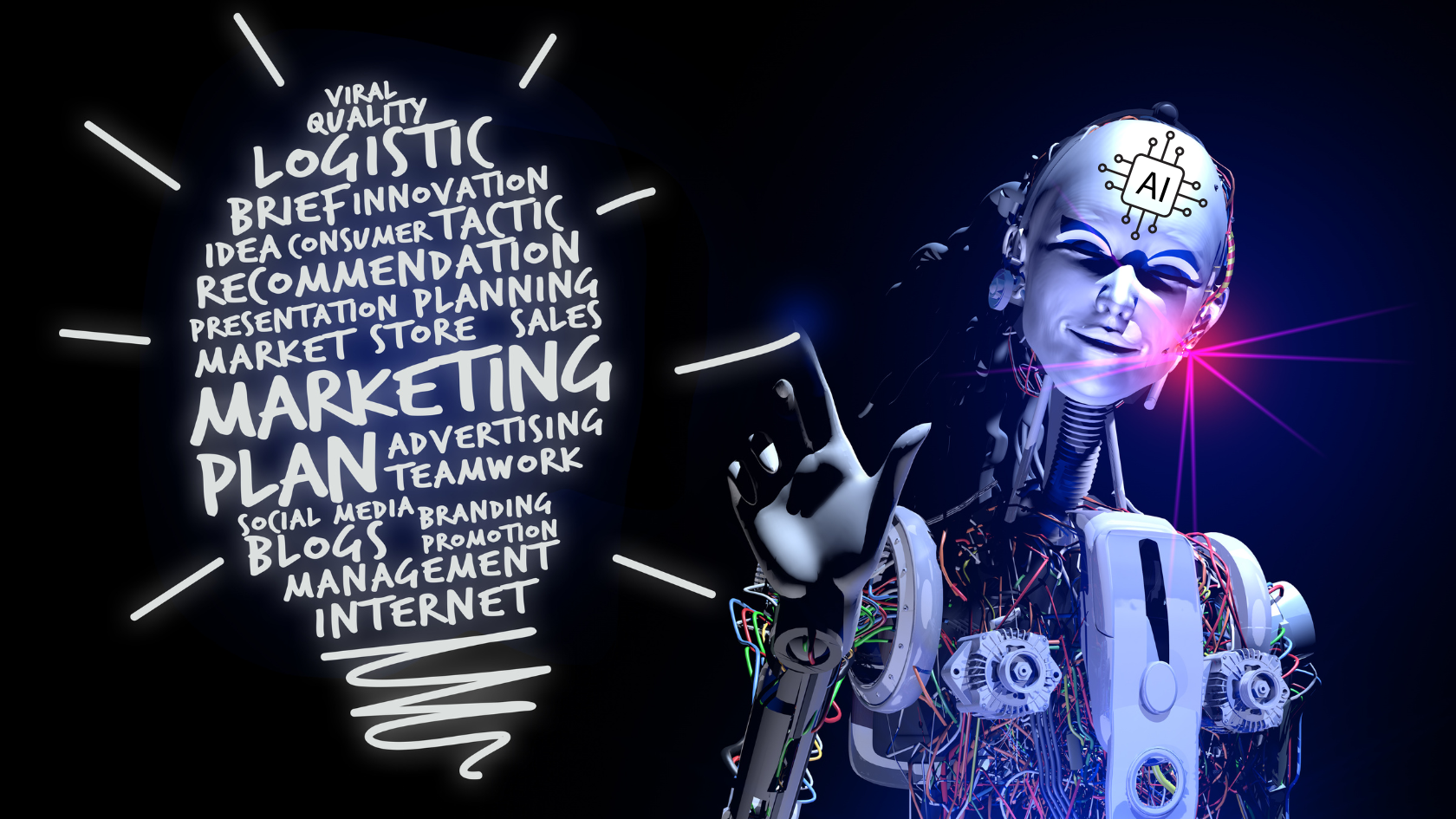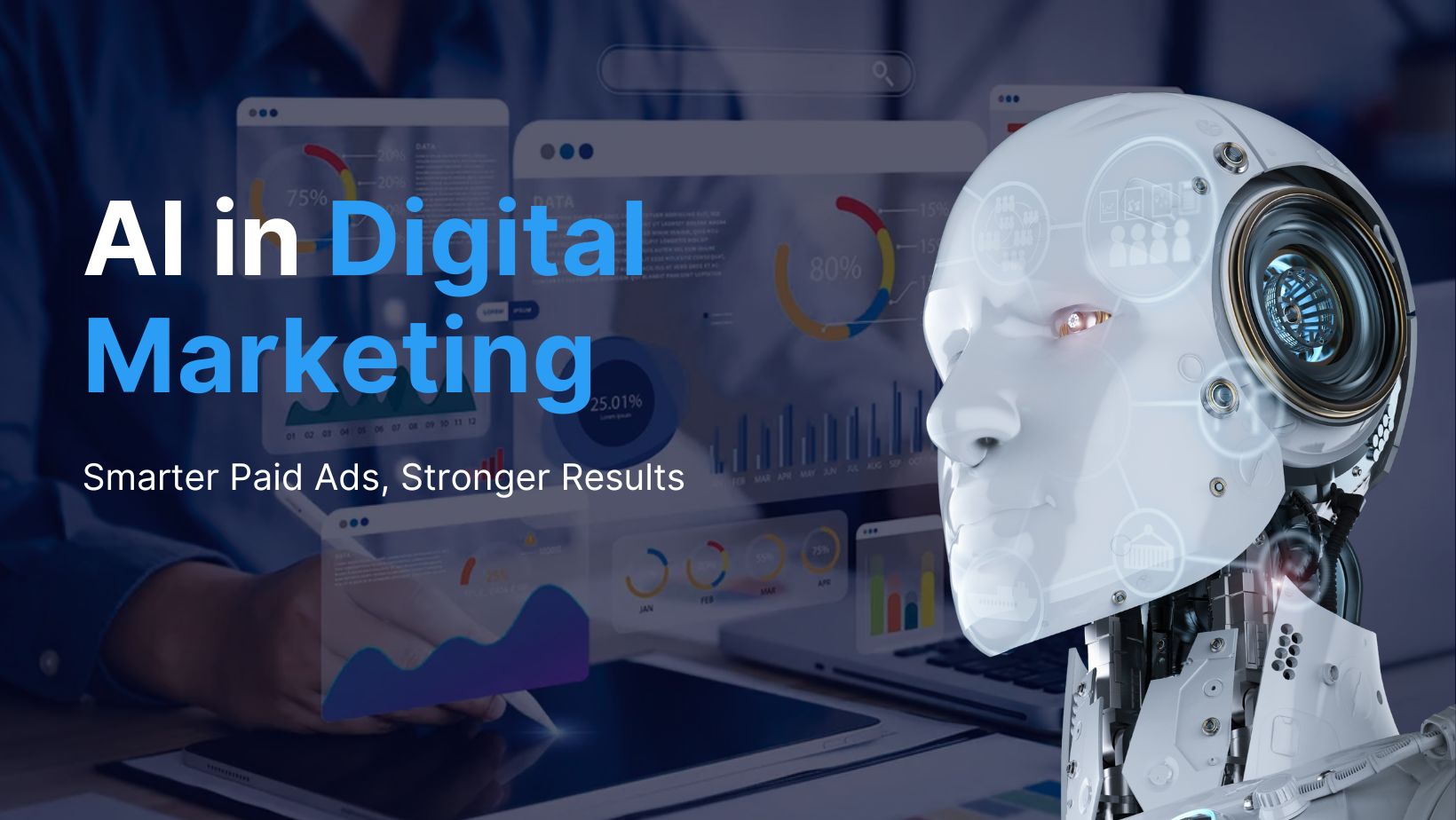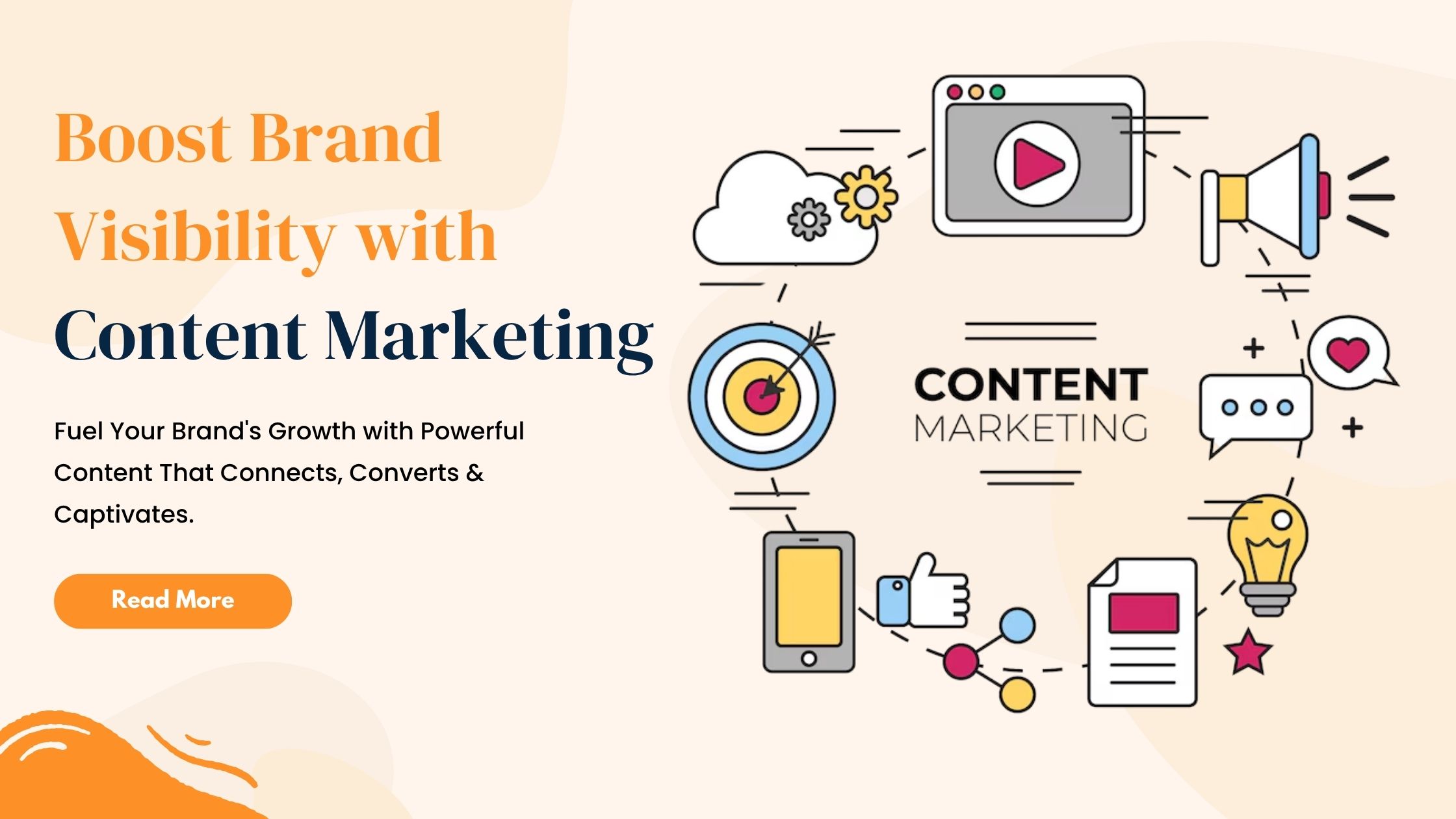Generative AI is transforming how companies approach marketing, delivering effective solutions that enhance efficiency and achieve maximum returns. According to a Deloitte survey, 82% of those surveyed reported gaining a financial return from their AI investments. This rapid success is driving businesses to explore generative AI for creating personalized, engaging, and data-driven campaigns at scale.
In this blog, we will delve into how Generative AI in marketing is revolutionizing strategies, its key applications, benefits, challenges, and what the future holds.
What Is Generative AI?
Generative AI is a form of artificial intelligence that creates original content such as text, images, audio, and video by learning from vast datasets. Unlike traditional AI, which analyzes and responds to existing data, generative AI produces entirely new outputs.
It uses advanced algorithms like neural networks and machine learning to recognize patterns and replicate human-like creativity, making it valuable across industries like marketing, healthcare, entertainment, and design.
How Generative AI Is Reshaping Marketing?
Generative AI in marketing isn’t only streamlining processes—it’s revolutionizing how marketing teams operate.
According to McKinsey, generative AI could add $4.4 trillion to global productivity annually. Marketing and sales are among the top sectors set to benefit, potentially capturing 75% of that value.
In fact, AI-driven productivity gains in marketing alone could boost efficiency by 5-15% of total marketing spend, translating to an estimated $463 billion annually.
Key reasons businesses are embracing Generative AI:
- Rising demand for personalized content at scale.
- Need for faster content turnaround.
- Desire to improve efficiency and ROI.
- Ability to generate data-driven insights instantly.
Core Applications of Generative AI in Marketing
Automated Content Generation
Generative AI tools can be trained to understand brand voice, target audience, and specific topics, allowing businesses to generate high-quality content at scale.
- Blog Posts & Articles
- Product Descriptions
- Ad Copy
SEO Optimization
AI enhances search engine optimization by recommending keywords, improving meta descriptions, and structuring content marketing strategies effectively.
AI-Powered SEO Features:
- Topic clustering based on keyword relevance.
- SEO-optimized blog outlines and meta tags.
- Automatic alt-text generation for images.
Personalized Marketing Campaigns
AI can analyze past interactions, purchase behavior, and browsing history to suggest personalized content, offers, and recommendations, significantly improving customer engagement.
- Email Customization: Tailors subject lines and content to user preferences.
- Recommendation Engines: Suggests products based on browsing history.
- Dynamic Ads: Adjusts ad content in real-time to match user interests.
Pro Tip: Collaborate with expert PPC consulting services that optimize and manage AI-powered dynamic ads for maximum ROI.
Social Media Marketing
Generative AI examines engagement patterns to determine the best posting times, top-performing content, and the most effective tone of voice.
Social platforms demand high-frequency, engaging content. Generative AI in marketing assists by creating platform-specific content at scale. Stay visible and relevant by partnering with top social media marketing services that harness AI to deliver high-impact campaigns.
Examples:
- Auto-generating social media captions.
- Suggesting trending hashtags.
- Producing short-form videos and stories.
Audience Segmentation
AI helps companies divide large audiences into smaller, targeted groups based on behaviors, interests, and purchase history.
- Behavioral Analysis: Groups users by purchase history or website interactions.
- Demographic Clustering: Identifies key customer segments for tailored messaging.
- Predictive Segmentation: Forecasts future customer behavior for proactive targeting.
This segmentation is crucial for precision marketing, where reaching the right person at the right time makes a measurable difference.
Conversational Marketing and Chatbots
Generative AI powers intelligent chatbots that handle customer queries, offer product recommendations, and collect feedback in real-time.
Key Functions:
- 24/7 customer service and lead generation.
- Automated order tracking and issue resolution.
- Interactive product selection guidance.
Dynamic Visual and Video Content Creation
Visual content demands creativity and speed. Generative AI tools assist in producing unique images, promotional videos, and social media graphics.
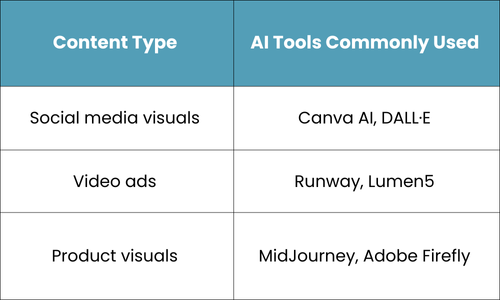
These tools cut production time and enable rapid campaign adjustments.
Predictive Analytics
Generative AI analyzes past behaviors and patterns to forecast future outcomes, enabling businesses to act proactively.
Examples:
- Predicting customer churn rates.
- Anticipating product demand spikes.
- Forecasting marketing campaign ROI.
AI-Powered Data Analysis
AI accelerates data analysis, transforming vast volumes of customer and market data into actionable insights.
- Real-time campaign tracking.
- Customer sentiment analysis.
- Competitor benchmarking.
With the right digital marketing services, businesses can fully leverage AI to optimize targeting, engagement, and campaign results.
Key Benefits of Generative AI in Marketing
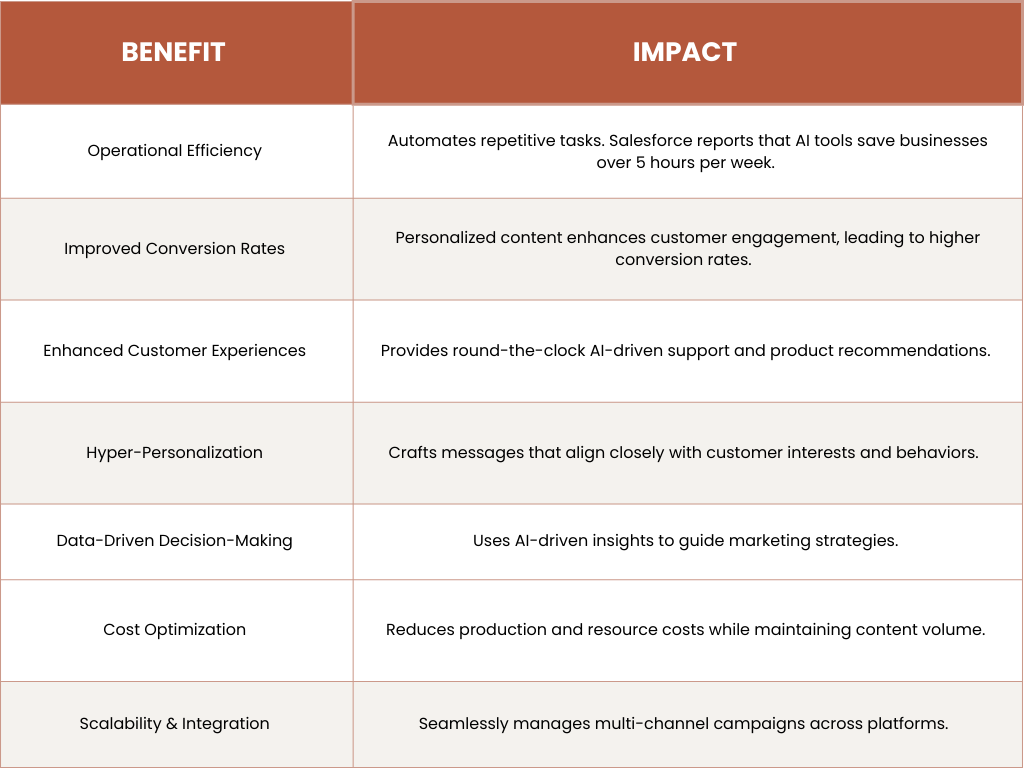
Real-World Examples of Generative AI in Marketing
These examples illustrate the tangible impact of generative AI on brand performance and consumer engagement.
- Coca-Cola: Partnered with OpenAI for ChatGPT and DALL-E, enhancing customer engagement and content creation.
- Sephora: Utilizes AI-driven tools to provide personalized beauty recommendations and virtual try-ons.
- Netflix: Uses generative AI to suggest personalized content, improving user engagement.
- JPMorgan Chase: Implements AI to automate customer service and streamline operations.
- Amazon: Leverages AI to optimize product recommendations, marketing strategies, and customer experience.
Industry Insights: Adoption Trends and Considerations
Generative AI adoption in marketing is accelerating. Key trends include:
- Rapid Adoption: A Statista study found that 73% of U.S. marketers use generative AI tools, such as chatbots, in their workflows.
- Future Growth: Gartner predicts that by 2025, 30% of outbound marketing messages from large organizations will be synthetically generated, up from less than 2% in 2022.
- CMO Confidence: A survey revealed that 70% of CMOs are optimistic about generative AI’s future impact. Additionally, an IBM survey concludes that 67% are planning to implement Generative AI within 12 months and 86% within 24 months.
Best Practices for Implementing Generative AI in Marketing
Define Clear Use Cases
Align Objectives: Identify specific areas like content creation or personalization where AI can add value.
Target Impact: Focus on use cases that directly support your business goals for maximum impact.
Ensure Data Quality
Use Accurate Data: Ensure data is clean, current, and relevant to your target audience.
Ensure Compliance: Adhere to data privacy regulations, such as GDPR, to safeguard customer information.
Establish Ethical AI Frameworks
Minimize Bias: Regularly audit AI models to ensure fairness and inclusivity.
Maintain Transparency: Being open about AI usage builds trust with customers, especially when their data is involved in personalization.
Combine AI and Human Creativity
Human Oversight: While AI can create content quickly, human oversight ensures that the output aligns with brand voice and creative standards.
Collaborate: Let AI enhance, not replace, use it as a tool to support and amplify human creativity.
Measure and Optimize Continuously
Track Results: Monitor KPIs like engagement and conversion rates to gauge AI effectiveness.
Iterate and Improve: Use insights gained from tracking results to continuously modify AI models.
Key Challenges and Ethical Risks in Generative AI Marketing — and How to Handle Them
While generative AI in marketing offers immense potential, it also poses challenges. The table below outlines key issues, their implications, and recommended actions:
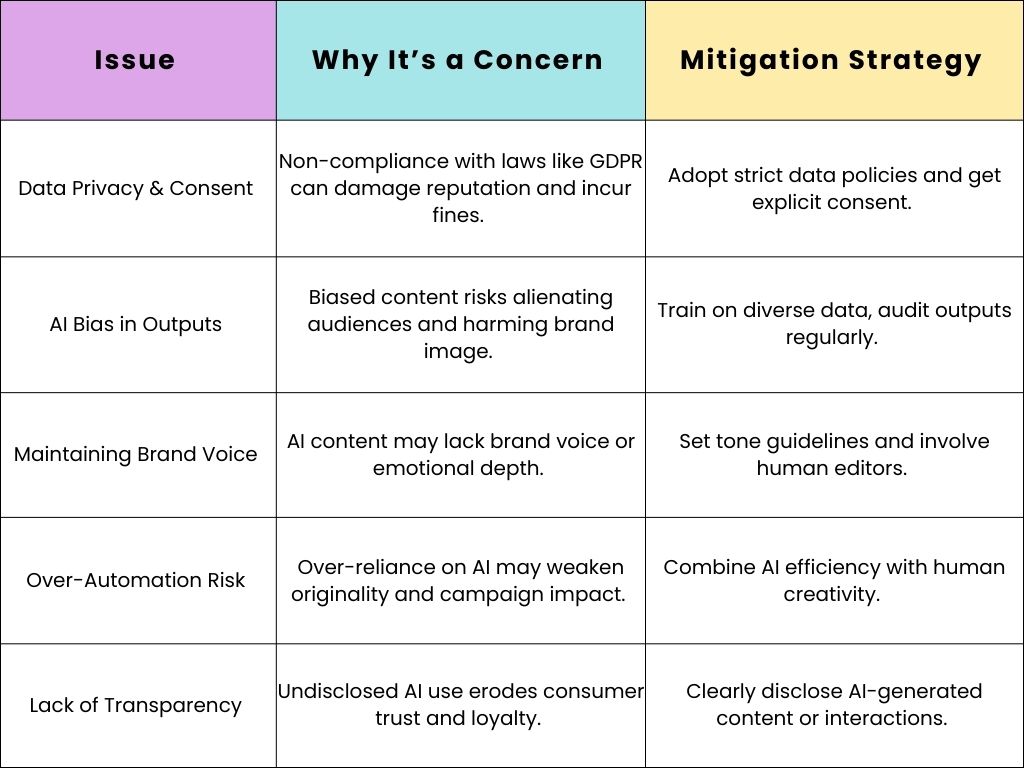
Trends in Generative AI Marketing
Multimodal AI
By 2027, 40% of Gen AI tools will be multimodal — combining text, images, audio, and video, up from just 1% in 2023 (Gartner). This will result in richer, more interactive brand experiences and deeper human-AI interactions.
Infact, ChatGPT and Google’s Gemini have already introduced multimodal capabilities.
Voice-Driven Campaigns
As smart devices and voice assistants become standard, brands will lean into AI-powered, voice-activated campaigns.
A great example: Blueair’s interactive audio ads on Alexa drove a 45% increase in new-to-brand visits and a 94% higher add-to-cart rate using Amazon’s Audio Generator.
Integration with Immersive Technologies
Merging generative AI with augmented reality (AR) and virtual reality (VR) for more interactive marketing experiences.
Brands will offer virtual product try-ons, immersive ads, and interactive experiences, driving deeper customer engagement and product awareness.
Virtual Influencers
AI-generated influencers create lifelike personas to represent brands in digital spaces. They will help ensure that a brand’s message is consistently aligned with its values, delivering a more predictable and controlled image.
Autonomous Marketing Platforms
We’re moving closer to fully autonomous marketing platforms that can handle everything from creating content to running campaigns and analyzing results — all with minimal human input.
Conclusion
In a nutshell, Generative AI has the ability to automate tasks, generate personalized content, and enhance SEO strategies. The brands that embrace its potential while managing its risks will lead the next chapter in customer engagement and brand building. As we’ve seen, companies like Coca-Cola, Sephora, and Amazon are already harnessing the power of generative AI to transform their marketing efforts.
Woosper helps businesses like yours leverage AI-driven marketing solutions to stand out, engage customers, and drive results. Position your business for success in the AI-driven era—connect with our experts today.
FAQ
In what way can generative AI boost sales efficiency?
It automates lead generation, personalizes sales outreach, and streamlines tasks, allowing sales teams to focus on high-value activities.
What is generative AI in market research?
Generative AI analyzes data, uncovers trends, and predicts behavior, helping businesses make faster, data-driven decisions.
How does AI drive innovation?
AI accelerates data analysis, automates processes, and identifies trends, driving new ideas and creative solutions.
How is generative AI shaping the future of marketing?
Generative AI enhances content creation, personalizes customer interactions, and optimizes strategies for more efficient marketing.


